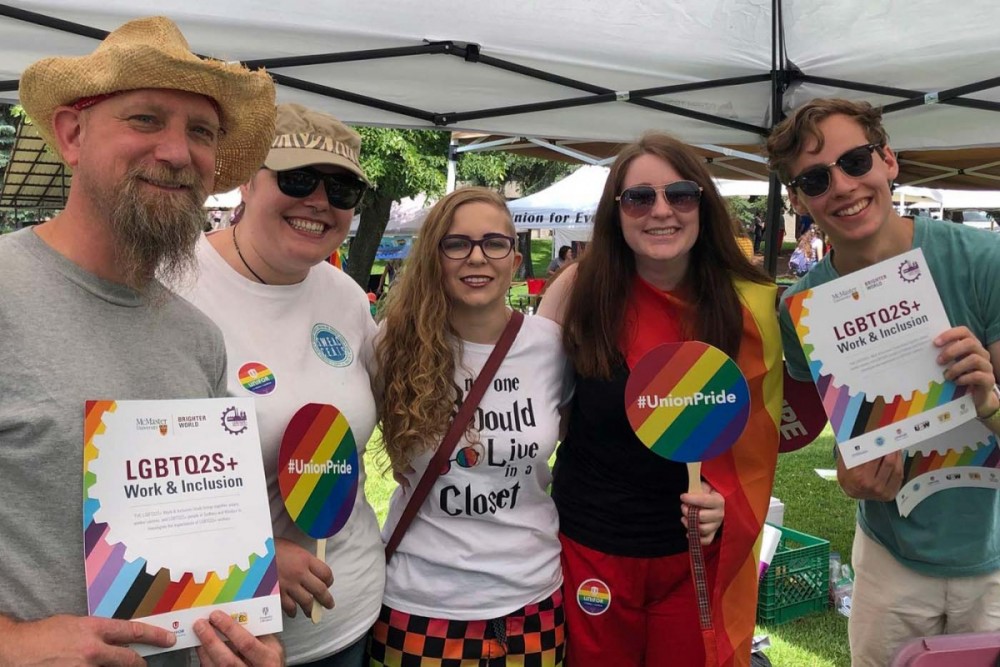
Anyone who has worked with the public has likely dealt with irate customers. Abuse and aggression from customers is a common experience in ‘low wage service’ jobs. These are jobs that are customer facing, pay at or just above the minimum wage, and are precarious and unstable. Over the past 50 years the number of people Canada and the US working in low wage services has expanded so that it now surpasses the number of people working in manufacturing. Women and people who are racialized as non-white are more likely to be working in these jobs, as are LGBTQ+ people.
Given that LGBTQ+ people are frequently employed in low wage services, we decided to look at how gender and sexuality influence their experiences of customer abuse and aggression in a recent article in Work, Employment, and Society. As we expected, interviews with 30 LGBTQ+ service workers in Windsor and Sudbury, Ontario, revealed that LGBTQ+ people experienced customer abuse and aggression related to their gender identity and sexual orientation.
What was more surprising, however, was that abuse from customers was influencing how workers presented their gender identities and sexual orientations on the job, effectively controlling their appearances and behaviours at work. Customers, then, were playing a key role in setting the norms of the sector.
What causes customer abuse and aggression?
Over the years, researchers have tried to unpack the dynamics between customers and service workers to better understand what contributes to abusive and aggressive behaviour. A key concept that has emerged from this research—termed ‘customer sovereignty’—suggests that service workplaces set customers up with high expectations for the service experience, while also trying to maximize efficiency. The result is that customers expect that they will be given exceptional treatment but are instead met by a worker trained to quickly guide them through the service encounter so that they can get to the next customer.
This is where the idea of ‘sovereignty’ comes into play; when customers realize that they are not being given the ‘sovereign’ or ‘royal’ treatment they expect, they become irate and direct their anger at workers. Service workers are also often expected to be deferential to customers and have little room to resist.
Gender and sexuality in low wage services
But what about the role of gender and sexuality? Research about restaurant and retail work has also shown that many employers use the gender and sexuality of its workers to attract customers, which also sets customers’ expectations. One example is restaurant or bar owners who only hire female servers with the ‘right look,’ or who impose sexualized uniforms. Women then, might be more vulnerable to customer abuse because their bodies have become part of the customer experience.
For the most part, the ways that gender and sexuality are deployed in service workplaces follow heterosexual norms. LGBTQ+ service workers don’t fit easily into these boxes and as a result might not meet customer’s expectations. As a result, the experiences of LGBTQ+ service workers reveal the often-hidden ways that gender and sexual orientation influence the service interaction. We interviewed 30 LGBTQ+ service workers in Sudbury and Windsor Ontario in 2019.
LGBTQ+ workers and customer abuse
Like the women servers described above, the LGBTQ+ workers we interviewed describe feeling pressured by employers to alter their appearance to conform to desired norms. Employers pressured workers directly through uniform requirements, as well as more subtly by treating employees more harshly for dressing or acting in ways understood to be queer or non-binary. What differed for our respondents was that even in workplaces commonly understood to be gender neutral, such as fast food, employers communicated a desire for workers to present as cisgender women or men, and as heterosexual.
As the result of these negative experiences, workers in our study sought to conceal their gender and/or sexual identities to ‘fit in’ and avoid abuse and aggression at work. Some participants talked about changing their clothes and even mannerisms to better play the part of the ‘desirable’ service worker.
In several instances, customer abuse and aggression both acted directly and influenced management’s decisions to control the gender presentation of 2SLGBTQ+ workers. Instead of intervening in instances of abuse and aggression to protect their staff, management often prioritized customer satisfaction by giving in to customer demands. This was more likely to be the case when the abusive customer was a big spender or when multiple customers were involved. Prioritizing profit over the safety of 2SLGBTQ+ workers in these cases, employers further entrenched cisnormativity and heteronormativity in the workplace.
Conclusions
So, what does this all mean? By looking at the experiences of LGBTQ+ service workers, our study shows how customer expectations in many everyday spaces often also include a desire for cis-normativity and heterosexuality, which can lead to abuse and aggression when these expectations aren’t met.
What’s more, we demonstrate that customer abuse and aggression is not only a reaction to the contradictory impulses of the service interaction and unmet expectations, but is also a controlling force shaping workers’ behaviour and ultimately the taken for granted gender and sexuality norms in the workplace. Participants in the study changed aspects of their presentation to conform to gender and sexuality norms as a result of the abuse and aggression they experienced from customers. This form of ‘labour control’ acts both independently and in conjunction with the control on workers already imposed from management.
While legal protections such as human rights codes can start to help workers resist this type of pressure, more avenues are needed to truly empower LGBTQ+ and allies in low wage services to resist and challenge cisgender and heterosexual norms implicitly sanctioned by employers and society at large.
Read more
Suzanne Mills and Benjamin Owens. “Customer Abuse and Aggression as Labour Control Among LGBT Workers in Low-Wage Services” in Work, Employment, and Society 2021.

No Comments